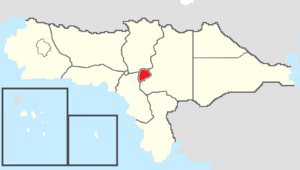Nehinaw Nation: Difference between revisions
(Created page with "{{WIP}} {{Infobox settlement |name = Nehinaw Nation |native_name = Mizragi Nehinaw |native_name_lang = |settlement_type = Sovere...") |
No edit summary |
||
| Line 29: | Line 29: | ||
|coordinates_footnotes = | |coordinates_footnotes = | ||
|subdivision_type = Country | |subdivision_type = Country | ||
|subdivision_name = [[Rizealand]] | |subdivision_name = {{flagicon|Rizealand}} [[Rizealand]] | ||
|subdivision_type1 = Before admission | |subdivision_type1 = Before admission | ||
|subdivision_name1 = [[Weanoke River Reservation]] | |subdivision_name1 = [[Weanoke River Reservation]] | ||
| Line 116: | Line 116: | ||
}} | }} | ||
The '''Nehinaw Nation''' (Nehinawish: Mizragi Nehinaw), commonly known as the '''Nehinaw''', is a sovereign indigenous nation in central [[Rizealand]] that borders [[Providence (state)|Providence]] to the north, [[Lyhoming]] to the east, and [[Fáel]] to the west. The Nehinaw Nation's territory has a total area of 11,788.59 square kilometers, making it the smallest sovereign indigenous nation and third smallest political division of Rizealand. The Nehinaw Nation also has a population of 75,336, making it the least populous indigenous nation and second least populous political division of Rizealand. The Nehinaw Nation's capital and largest settlement is [[Enkoodabooaoo]]. | The '''Nehinaw Nation''' (Nehinawish: Mizragi Nehinaw), commonly known as the '''Nehinaw''', is a sovereign indigenous nation in central [[Rizealand]] that borders [[Providence (state)|Providence]] to the north, [[Lyhoming]] to the east, and [[Fáel]] to the west. The Nehinaw Nation's territory has a total area of 11,788.59 square kilometers, making it the smallest sovereign indigenous nation and third smallest political division of Rizealand. The Nehinaw Nation also has a population of 75,336, making it the least populous indigenous nation and second least populous political division of Rizealand. The Nehinaw Nation's capital and largest settlement is [[Enkoodabooaoo]]. | ||
== Etymology == | |||
The Nehinaw Nation is named after the Nehinaw indigenous people that compose the Nehinaw Nation. The name "Nehinaw" is Nehinawish for "forest people" or "people of the forest." | |||
[[Category:Rizealand]] | [[Category:Rizealand]] | ||
Revision as of 22:01, 11 July 2021
This article is incomplete because it is pending further input from participants, or it is a work-in-progress by one author. Please comment on this article's talk page to share your input, comments and questions. Note: To contribute to this article, you may need to seek help from the author(s) of this page. |
Nehinaw Nation
Mizragi Nehinaw | |
|---|---|
Sovereign Indigenous Nation | |
| Motto(s): | |
 Map of Rizealand with the Nehinaw Nation in red | |
| Country | |
| Before admission | Weanoke River Reservation |
| Capital (and largest city) | Enkoodabooaoo |
| Joined Federation | February 6, 1976 |
| Government | |
| • President | Charlie Etchemin |
| • Deputy President | Ellis Mukki |
| • Legislature | Nehinaw Tribal Council |
| • Federal representation | Councilors
Representatives |
| Area | |
| • Total | 11,788.59 km2 (4,551.60 sq mi) |
| Population (2021) | |
| • Total | 75,336 |
| • Density | 6.39/km2 (16.6/sq mi) |
| Time zone | UTC+10 (Central) |
| Abbreviation | NN |
| ISO 3166 code | RZ-NN |
| Website | www |
The Nehinaw Nation (Nehinawish: Mizragi Nehinaw), commonly known as the Nehinaw, is a sovereign indigenous nation in central Rizealand that borders Providence to the north, Lyhoming to the east, and Fáel to the west. The Nehinaw Nation's territory has a total area of 11,788.59 square kilometers, making it the smallest sovereign indigenous nation and third smallest political division of Rizealand. The Nehinaw Nation also has a population of 75,336, making it the least populous indigenous nation and second least populous political division of Rizealand. The Nehinaw Nation's capital and largest settlement is Enkoodabooaoo.
Etymology
The Nehinaw Nation is named after the Nehinaw indigenous people that compose the Nehinaw Nation. The name "Nehinaw" is Nehinawish for "forest people" or "people of the forest."